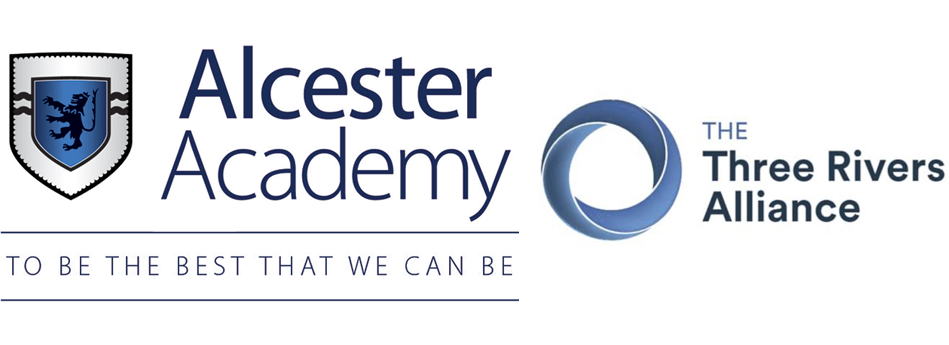English & LRC

English
jessicalee@alcesteracademy.org.uk
FionaKirk@alcesteracademy.org.uk
Miss A Lewis: Teacher of English
AlexLewis@alcesteracademy.org.uk
adelegorner@alcesteracademy.org.uk
saschabartlett@alcesteracademy.org.uk

English
Key Stage 3
Curriculum Intent
The English Department at Alcester Academy is a successful and forward-thinking department which is characterised by a strong sense of collaboration and enthusiasm for our subject and our pupils.
We strive to foster within pupils a love of language and literature. We aim to develop pupils' ability to communicate effectively in a wide range of contexts; to enable pupils to use accurate Standard English and develop an interest in the richness of the English language in its various forms.
We believe English key stage 3 should very much behave as a skills-building approach to reading, writing and oracy. Our aim is to ensure all pupils are confident, critical and cultured in their ability to respond to, and create, non-fiction and fiction texts, so that they have a rich foundation for tackling the demands of the key stage 4 English curriculum and beyond.
Curriculum Implementation (see also Long Term Plans)
Pupils receive between three and five hours of English per week, with independent reading at the heart. When entering the academy, pupils are set according to key stage 2 end points - setting is regularly reviewed.
Throughout years 7 and 8, topics are coherently structured and sequenced carefully to ensure that there is regular alternation of ambitious reading, writing, literature and language skills. By regularly re-visiting and developing each of these skills, our curriculum aligns with the national expectation to ensure that there is a well-rounded understanding of what is needed in English to progress.
We endeavour to provide pupils with the opportunity to read texts by contemporary authors as well as those celebrated within our literary heritage. When designing non-fiction lessons, we aim to design flexible units of learning that purposely relate to pupil experiences and interests- not being afraid to shy away from issues of the world that need to be discussed. We strive to offer a wide range of enrichment opportunities.
To achieve an accurate assessment of individual pupils, we formatively assess twice per term to ensure that whole school data and assessment has the holistic progress of our pupils. We assess using ‘best books’ that aim to ‘show case’ edited work over a sequence of lessons alongside end of unit assessments. Each curriculum year also features an end of year exam. Data is used to identify and document under-performance, for pupil and teacher, which, in turn, triggers a series of interventions such as extra-reading provision or setting reviews to ensure ‘below-track’ pupils are at the forefront of teachers’ minds in being able to access future learning. Pupils’ reading is also assessed through ‘Accelerated Reader’ which deepens awareness of where pupils need to improve their reading abilities together with tracking reading ages.
Above all else, we provide a broad and balanced curriculum which offers a rich and diverse range of learning experiences enabling all pupils to enjoy and achieve.
Curriculum Impact
Key stage 3 learners achieve a broad knowledge base and diverse experience that blends into the learning required at key stage 4. They are able to transfer skills learnt to access more demanding texts. They are more analytical and appreciative of writers’ intentions, and better written communicators with a developing maturity, accuracy and flexibility in the way they write.
Key Stage 4
GCSE English Language (AQA)
GCSE English Literature (AQA)
Curriculum Intent
Our curriculum for key stage 4 is designed to promote independent learning and high quality engagement whilst ensuring the very best outcomes for learners- regardless of starting points. By supporting pupils’ welfare and academic ability, we believe pupils achieve an enjoyment and preparation of English that often ignites a hunger to study English at KS5 and beyond- we want them to feel proud of their progress. Our aim is to regularly challenge pupils to create and consider developed responses in a nurturing environment where teaching is always pitched high.
Curriculum Implementation (see also Long Term Plans)
Key stage 4 is designed with use of the GCSE specifications. Pupils have 5 hours of English a week. Time has been spent in structuring the correct level of exposure and deep learning of set texts. Year 9 acts as a transition year- pupils are gradually introduced to set texts and explicit exam questions. Year 10 is a coverage year- pupils are taught the majority of set texts for literature and develop closer awareness of specific English Language content. Year 11 is a consolidation and developmental year- pupils are tested and challenged with questions that aim to prepare them for terminal examinations.
Pupils will be internally examined up to four times during key stage 4. This rigorous approach ensures that we can moderate and make judgements on pupils and trigger any necessary interventions. Underperformance is documented and strategies put in place to address issues. Years 9 and 10 follow the same exercise book system as key stage 3, but year 11 work from file paper and lever arch files, so that they can organise their own revision and practise of each component whilst receiving more timely and specific feedback from teachers.
Curriculum Impact
Whilst creating motivated, mature and thoughtful students of English, results are consistently and significantly above the national average. As a result, a large proportion of our students continue to study English Language and Literature at KS5.
Media Studies
Key Stage 4
Eduqas (WJEC) GCSE Media Studies
Curriculum Intent
Our Media Studies curriculum offers a broad, engaging and stimulating course of study which provides learners with the opportunity to develop a thorough knowledge and understanding of the media and its influences on the world we live in. Through a variety of thought-provoking discussion and field-based research, pupils secure a confident understanding of media’s power over consumers. Lessons are designed to build students’ assurance with familiar and unfamiliar popular culture texts, allowing them to develop academically and socially.
Curriculum Implementation (see also Long Term Plans)
Pupils have two hours of Media Studies a week. In Year 9, the first term is dedicated to An Introduction to Media Studies, whereby pupils undertake a basic study of media terminology and analytical strategies. Print media texts offer an introductory analysis using key media theory and representations. Throughout Year 9, pupils begin to study the chosen set texts for Component 1 and Component 2, after some initial study of unseen media texts. They are also introduced to the ‘practical’ side of Media Studies early on, in order for them to understand what is required for their controlled assessment piece. In Year 10, pupils undergo a more intensive coverage of the GCSE set texts, where they regularly practise exam style questions. In Year 11, pupils begin the year consolidating and applying their knowledge of media language through their Non-examination assessment (worth 30%). They respond to a set brief and produce a media text for a specified audience. The rest of Year 11 is dedicated to building upon existing media knowledge and revising all of the set texts in preparation for their terminal examinations.
A range of teaching and learning styles are offered throughout all years – pupils benefit from the ability to lead and contribute to whole class discussions, as well as working independently on analytical exploration of media texts. Independent research of music artists and media stars is regularly encouraged through interactive homework assignments or dedicated computer-suite lessons. Media students are also enrolled in Google Classroom suites, whereby teachers can share resources, set homework assignments and generate additional discussion opportunities.
Pupils will be internally examined (in a formal setting) up to three times throughout the course. In line with the detailed assessment calendar, teachers can also offer mini-assessment points at the end of each module, ensuring our reflective and reliable progress tracker is as useful as possible. Underperformance is documented on class packs and strategies are put in place to address areas of development. Pupils in Year 9 begin the course with an exercise book for all of their study. In Year 10 and Year 11, pupils work with file paper and lever arch files, ensuring their revision notes are easily organised into components for the exam.
Curriculum Impact
As this is a new specification, we, as a school, are currently teaching our first cohort who will sit the exam in Summer 2020. With the release of grade boundaries in August 2019, we will be able to update our existing progress tracker to include working at grades and more accurate target grades.
Learning Resource Centre
The Learning Resource Centre (LRC) is the vibrant heart of the school, both physically and functionally. It serves all departments, staff, and students, with Mrs J Hands as the LRC Manager, supported by student librarians during breaks and lunchtimes.
Open Access and Resources
The LRC maintains an open-door policy throughout the school day, as well as before and after school hours. This privilege is highly valued by pupils, ensuring that the room is in constant use. While generally untimetabled, staff can book the LRC for specific periods.
We focus on developing essential skills, delivering literacy and reading strategies to year 7 students and reinforcing research skills in subsequent years. Students are encouraged to leverage Internet technology to strengthen their information retrieval abilities, emphasizing the importance of selecting the most suitable research path, whether electronic or hard copy.
Our extensive collection includes fiction and non-fiction books, newspapers, journals, subscribed websites, and subject-specific information packs. We also subscribe to WCC’s Schools Library Service, which provides additional stock, facilitates participation in book awards, and offers expert advice.
The LRC is well-equipped with 31 networked computers, 50 networked laptops, and 2 iPads. A photocopier/printer/scanner is available for student use. A plasma screen keeps students informed about developments within the LRC and across the school, and an LRC Google Classroom provides a wealth of additional information.
Fostering a Love of Reading
Accelerated Reader Strategy
The Academy champions the Accelerated Reader program to enhance students' literacy development and reading comprehension. Dedicated time is allocated within the curriculum for the effective implementation of this program, and students in years 7, 8, and 9 are actively encouraged to read books within their range and take quizzes.
Promoting Reading for Pleasure
Beyond structured programs, students are encouraged to read for pleasure through various regional and national shadowing schemes. We organise author visits and literacy workshops, and highlight events like World Book Day and other literacy celebrations. Students actively participate in the Warwickshire Secondary Book Award and the Warwickshire Teen Book Award.
The LRC's commitment to providing excellent resources, implementing effective programs, and offering outstanding facilities has been recognised with a Warwickshire County Council Gold Certificate.
Expectations in the LRC
The Learning Resource Centre (LRC) is a space for quiet and calm study, work, and reading. To ensure a productive environment for everyone, we ask that you follow these simple guidelines:
Behavioural Expectations
- Maintain a quiet atmosphere: The LRC is designed for focused work. Please keep noise levels down.
- No food or drink: To help keep our resources clean and in good condition, please don't bring food, drinks, or chewing gum into the library.
- Silence your phones: Mobile phones should be turned off and kept in your bag.
- Store bags in the cloakroom: For safety and to keep the space clear, please leave your bags in the cloakroom before entering the LRC.
- Show respect and consideration:
- Enter and exit quietly.
- Be polite and respectful to all staff members.
- Listen to and follow instructions given by staff.
- Keep the LRC tidy:
- Return all used books to their shelves.
- Place any rubbish in the bins provided.
- Log out of computers after use.
- Push your chair under the table when you're finished.
Borrowing and Returning Resources
Borrowing: Once you've chosen the resources you'd like to borrow, bring them to the library desk. The Librarian will log them into our system and stamp them with the return date. You can either return the items by this date or speak to the Librarian to renew them.
Returning: Please hand items directly to the library staff at the desk. If staff aren't available, you can leave your items in the Returns Box located under the library desk.
Overdue Items
We don't charge daily fines for overdue items. However, after a series of reminders sent to your school Gmail, we'll assume the item is lost, and the full cost of the resource will be charged to your account.
Here's how we handle overdue items:
- Reminders will be sent via your English teacher or form tutor.
- You'll receive emails to your school Gmail recalling the item.
- Finally, an email or letter will be sent to your parents and carers informing them of a charge to your student account.
Useful LRC QR codes:

Long Term Plans & Assessment Plans
English LTP Year 9
English LTP Year 10
English LTP Year 11
Media LTP Year 9
Media LTP Year 10
Media LTP Year 11
Examples of the kinds of assessments to expect: English Assessment Plan
Examples of the kinds of assessments to expect: Media Assessment Plan




